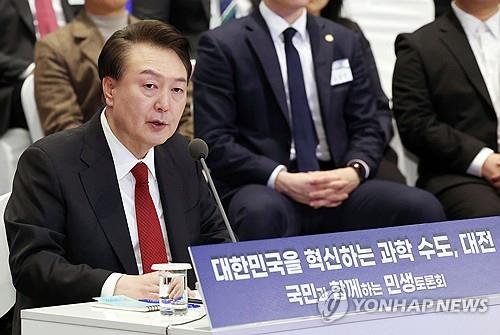- California Assembly OKs highest minimum wage in nation
- S. Korea unveils first graphic cigarette warnings
- US joins with South Korea, Japan in bid to deter North Korea
- LPGA golfer Chun In-gee finally back in action
- S. Korea won’t be top seed in final World Cup qualification round
- US men’s soccer misses 2nd straight Olympics
- US back on track in qualifying with 4-0 win over Guatemala
- High-intensity workout injuries spawn cottage industry
- CDC expands range of Zika mosquitoes into parts of Northeast
- Who knew? ‘The Walking Dead’ is helping families connect
Yoon pledges new stipends, more scholarships for science, engineering students
President Yoon Suk Yeol said Friday the government will give stipends to graduate students in science and engineering and expand the scope of scholarships to assist both undergraduate and graduate students of science.
Yoon announced the plan during a government-public debate held in Daejeon, 139 kilometers south of Seoul, as he underscored his commitment to enhancing the country’s competitiveness in science and technology by fostering new talent in the field.

The stipends will be given to full-time graduate students in the science and engineering fields who are taking part in state research and development projects, with master’s degree students receiving a minimum 800,000 won (US$600) per month and PhD students receiving a minimum 1.1 million won, Yoon said.
“We will begin in earnest to provide stipends to graduate students, which has been a long-cherished wish of the science and technology circles for 20 years,” he said during the debate, which brought together some 50 members of the public, including researchers, graduate students and businesspeople, as well as relevant government officials.
Yoon also said the total size of government scholarships will be raised by 130 billion won this year so that presidential science scholarships, which have so far been offered only to undergraduate students, can also be given to graduate students, resulting in each person receiving an average 25 million won annually.
The debate was the 12th in a series of sessions on people’s livelihood issues. Previous editions have dealt with issues ranging from transportation and housing to medical reform and digital policies.
Yoon said Friday he will transform Daejeon into a city befitting its status as the “science capital” by improving its connectivity and accelerating its urban development.
In particular, he said he will work to make visible progress within his term on burying the city’s railroads underground and opening an express train service linking Daejeon to the nearby cities of Sejong and Cheongju.
The new train service will help Daejeon create synergy with the administrative functions of Sejong and the bio and semiconductor industries of Cheongju, he said.











